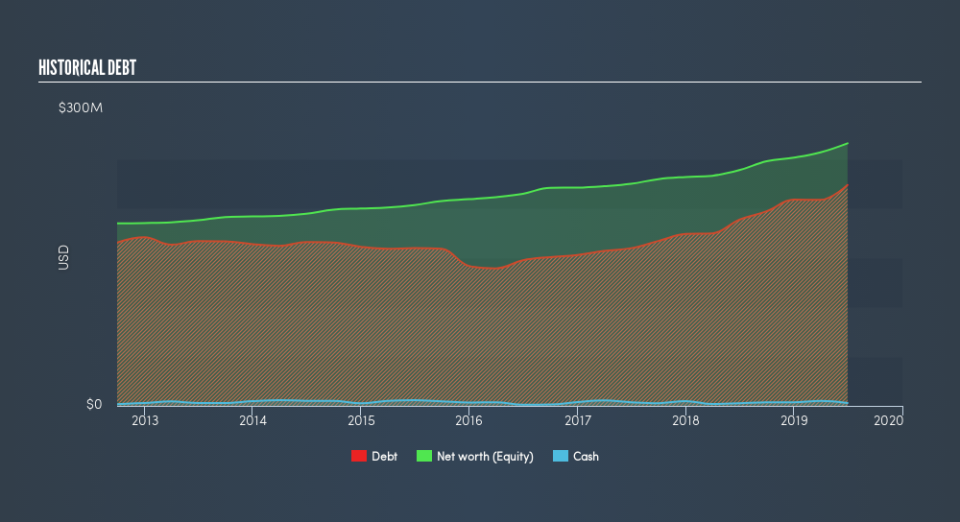Is Middlesex Water (NASDAQ:MSEX) A Risky Investment?

Warren Buffett famously said, 'Volatility is far from synonymous with risk.' So it might be obvious that you need to consider debt, when you think about how risky any given stock is, because too much debt can sink a company. We can see that Middlesex Water Company (NASDAQ:MSEX) does use debt in its business. But is this debt a concern to shareholders?
Why Does Debt Bring Risk?
Debt assists a business until the business has trouble paying it off, either with new capital or with free cash flow. Ultimately, if the company can't fulfill its legal obligations to repay debt, shareholders could walk away with nothing. While that is not too common, we often do see indebted companies permanently diluting shareholders because lenders force them to raise capital at a distressed price. Of course, the upside of debt is that it often represents cheap capital, especially when it replaces dilution in a company with the ability to reinvest at high rates of return. When we examine debt levels, we first consider both cash and debt levels, together.
Check out our latest analysis for Middlesex Water
What Is Middlesex Water's Debt?
As you can see below, at the end of June 2019, Middlesex Water had US$230.3m of debt, up from US$188.4m a year ago. Click the image for more detail. And it doesn't have much cash, so its net debt is about the same.
A Look At Middlesex Water's Liabilities
According to the last reported balance sheet, Middlesex Water had liabilities of US$102.5m due within 12 months, and liabilities of US$439.3m due beyond 12 months. On the other hand, it had cash of US$2.99m and US$20.0m worth of receivables due within a year. So it has liabilities totalling US$518.9m more than its cash and near-term receivables, combined.
This deficit isn't so bad because Middlesex Water is worth US$961.3m, and thus could probably raise enough capital to shore up its balance sheet, if the need arose. But it's clear that we should definitely closely examine whether it can manage its debt without dilution.
We use two main ratios to inform us about debt levels relative to earnings. The first is net debt divided by earnings before interest, tax, depreciation, and amortization (EBITDA), while the second is how many times its earnings before interest and tax (EBIT) covers its interest expense (or its interest cover, for short). The advantage of this approach is that we take into account both the absolute quantum of debt (with net debt to EBITDA) and the actual interest expenses associated with that debt (with its interest cover ratio).
Middlesex Water has a debt to EBITDA ratio of 4.8 and its EBIT covered its interest expense 4.9 times. This suggests that while the debt levels are significant, we'd stop short of calling them problematic. Sadly, Middlesex Water's EBIT actually dropped 7.8% in the last year. If earnings continue on that decline then managing that debt will be difficult like delivering hot soup on a unicycle. When analysing debt levels, the balance sheet is the obvious place to start. But it is future earnings, more than anything, that will determine Middlesex Water's ability to maintain a healthy balance sheet going forward. So if you want to see what the professionals think, you might find this free report on analyst profit forecasts to be interesting.
Finally, a company can only pay off debt with cold hard cash, not accounting profits. So it's worth checking how much of that EBIT is backed by free cash flow. Over the last three years, Middlesex Water saw substantial negative free cash flow, in total. While that may be a result of expenditure for growth, it does make the debt far more risky.
Our View
We'd go so far as to say Middlesex Water's conversion of EBIT to free cash flow was disappointing. But at least its interest cover is not so bad. We should also note that Water Utilities industry companies like Middlesex Water commonly do use debt without problems. Looking at the bigger picture, it seems clear to us that Middlesex Water's use of debt is creating risks for the company. If everything goes well that may pay off but the downside of this debt is a greater risk of permanent losses. Given our hesitation about the stock, it would be good to know if Middlesex Water insiders have sold any shares recently. You click here to find out if insiders have sold recently.
Of course, if you're the type of investor who prefers buying stocks without the burden of debt, then don't hesitate to discover our exclusive list of net cash growth stocks, today.
We aim to bring you long-term focused research analysis driven by fundamental data. Note that our analysis may not factor in the latest price-sensitive company announcements or qualitative material.
If you spot an error that warrants correction, please contact the editor at editorial-team@simplywallst.com. This article by Simply Wall St is general in nature. It does not constitute a recommendation to buy or sell any stock, and does not take account of your objectives, or your financial situation. Simply Wall St has no position in the stocks mentioned. Thank you for reading.

